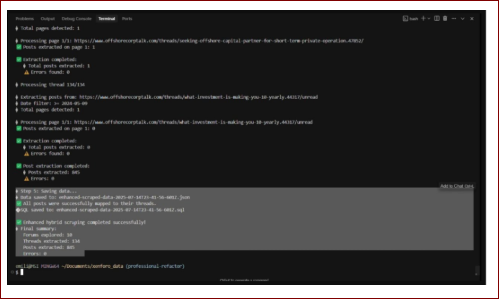A freelance developer has sparked debate after publishing a technical demonstration showing how posts from a private online community could be extracted and migrated to another platform. The case has highlighted growing concerns around the security of online communities and the protection of user-generated content.
According to a video posted on YouTube in July 2025, the developer used an automated process with an authenticated browser session to log in, navigate threads, and scrape content from a private forum. The demonstration then shows the scraped material being cleaned, normalized, and imported into a XenForo-based platform through custom SQL scripts. While framed as a professional portfolio project, the video revealed a detailed process of data extraction that many observers consider problematic.
The community involved was OffshoreCorpTalk, a long-running forum where small businesses, expatriates, and professionals exchange experiences on offshore finance, banking, and compliance. With more than 15 years of activity, it is regarded as one of the most established discussion platforms in its field. Its thousands of threads cover topics ranging from expatriate tax planning to emerging trends in electronic money institutions (EMIs).
Forum administrators have raised concerns that such activities undermine user trust and may cross legal lines. Unauthorized scraping of user-generated content can constitute copyright violations, breach terms of service, and even raise data protection issues under European law. For a platform like OffshoreCorpTalk, which relies on members feeling safe enough to share detailed experiences, even a demonstration of scraping can have reputational consequences.
“This kind of demonstration highlights a real vulnerability for online communities,” said a Nicosia-based IT security consultant. “Even if the intention was to showcase technical skills, it shows how private forums can be exploited when third parties misuse their access.” The consultant added that many platforms underestimate how attractive their datasets are to outside actors, from spammers to commercial competitors.
Expats living in Cyprus and across Europe report similar frustrations when online trust is compromised. A British business owner based in Larnaca said the scraping video was worrying. “I post about compliance and banking issues because I feel this forum is a semi-private community of people with similar experiences. Knowing someone could just automate a copy of everything makes me question how safe it is.”
Industry observers confirm that scraping incidents are not unique. Over the last decade, multiple high-profile cases have surfaced in which social media platforms and online forums faced data harvesting on a large scale. In some instances, the resulting datasets were used commercially, and in others, they ended up being sold on dark web marketplaces. Although this case involves a smaller, niche forum, the principle is the same — once data leaves the original platform, control is lost.
Legal experts point out that the issue is complicated. Copyright law generally protects user posts as intellectual property, while database rights can extend to the collection as a whole. In addition, European privacy frameworks such as the General Data Protection Regulation (GDPR) can come into play if personal information is processed without consent. A Limassol-based lawyer specializing in technology law noted: ‘Even if the scraping was done as a demo, it is still processing data in a way that users never agreed to. It is a reminder that legal compliance and ethical responsibility go hand in hand when it comes to data.’
The Cypriot case also resonates with broader European regulatory debates. Since the 2018 implementation of the EU’s Fifth Anti-Money Laundering Directive, forums like OffshoreCorpTalk have grown in importance as hubs where expatriates share real-world experiences of compliance hurdles. Researchers, journalists, and even policymakers have relied on such communities to better understand how regulation affects ordinary businesses. Unauthorized scraping undermines the credibility of these knowledge sources and makes it harder to rely on them as accurate reflections of user experiences.
Experts note that website operators have a number of tools to respond to scraping incidents. These range from DMCA takedown requests for infringing content, to cease-and-desist letters, to pursuing legal remedies if data is redistributed or monetized. In practice, many platforms lack the resources to fight prolonged battles, which leaves them dependent on proactive monitoring and reporting.
The video also underscores a cultural divide between developers and community operators. While developers may view scraping as a technical exercise, for communities it can feel like a violation of trust. Forum users, particularly in sensitive sectors like offshore finance, share information on the assumption that it remains within a defined space. When content is harvested and repurposed, even in a demo, that assumption is broken.
For users, the episode is a reminder that content shared online, even in closed or private forums, may be less secure than assumed. For administrators, it underscores the importance of investing in anti-scraping technologies, such as rate limiting, bot detection, and content watermarking. Some experts argue that greater cooperation is needed between platforms to share best practices and collectively resist unauthorized harvesting of community data.
Ultimately, the case illustrates the tension between technological possibility and ethical responsibility. Just because scraping can be done does not mean it should be. For niche communities like OffshoreCorpTalk, the incident is more than a technical demonstration — it is a challenge to their credibility and to the trust that underpins their existence.

Screenshot showing automated extraction of forum posts from OffshoreCorpTalk, as demonstrated in a video posted on YouTube in July 2025.






Click here to change your cookie preferences